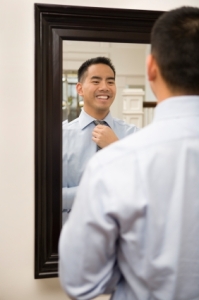 For the past month I have been making the rounds on the interview circuit in anticipation of leaving my current job (more on this later). Last week I was relating the gritty details of each interview with a close friend and expressed my anxiety about receiving an offer from any one of the companies where I was interviewing. My friend responded with these words of reassurance:
For the past month I have been making the rounds on the interview circuit in anticipation of leaving my current job (more on this later). Last week I was relating the gritty details of each interview with a close friend and expressed my anxiety about receiving an offer from any one of the companies where I was interviewing. My friend responded with these words of reassurance:
“Don’t worry. You have what everyone is looking for in a co-worker: Looks and personality.”
We both laughed at the time, but later I began to wonder if his words didn’t have at least some kernel of truth to them.
How great a role does appearance really play in career success?
While physical appearance is not supposed to legally be a factor in whether or not to hire/promote a person, studies have shown that attractive people, on average, make more than their less attractive counterparts.
For example, a study highlighted in The Regional Economist reports that overweight or obese women are shown to earn significantly less than their thinner peers:
“Economists Susan Averett and Sanders Korenman studied the effects of obesity on wages, using a sample consisting of individuals aged 16-24 in 1981 who were 23-31 in 1988. They showed that women who were obese according to their Body Mass Index (BMI) in both 1981 and 1988 earned 17 percent lower wages on average than women within their recommended BMI range.”
Women are not the only ones to suffer discrimination based on appearance. While obesity had a slightly negative effect on a man’s earning power, height seems to play a much more significant role in determining a man’s salary, with shorter men getting the “short end of the stick.”
The study revealed the following:
“Economists Nicola Persico, Andrew Postlewaite and Dan Silverman tried to explain the origin of the “height premium.” They focused on white men to avoid possible discrimination based on gender or race. After controlling for a number of family characteristics that are generally correlated with both height and wages (parents’ education, parents’ occupation and number of siblings), they found that for white men in the United States, a 1.8-percent increase in wages accompanies every additional inch of height.”
While nothing short of plastic surgery can make you taller (or even thinner in some cases) exuding a polished, professional appearance can do wonders in how co-workers treat and perceive you at work. A recent column in Diversity Inc. does an excellent job of explaining the importance of following the corporate dress code:
“Corporate culture will reflect what is necessary to do business with the widest range of people. Since the United States has the largest gross domestic product (GDP) of any other single nation–almost four times as large as the next largest economy (Japan)–it is only natural that other nations adopted our dress code. Further, psychological tests show that we are predisposed to trust people who look just like us. That’s one reason sycophantic behavior is often successful.
Most human beings really don’t like change. Having a dress code simplifies the number of variables we all have to deal with. This creates a comfort level from which we can deal with what business is there to do: Be profitable.”
Some might argue that following a prescribed dress code, such as a suit and tie, is conformist, stifling, and reminiscent of a drone scurrying around a hive. However, what a suit and tie says to co-workers, bosses and clients alike is “Yes, I understand you–how you dress, how you think, what your needs are. You can relate to me and I to you.” And in business, this could mean the difference between getting that corner office or making that big sale.
——————————–
Related Reading: